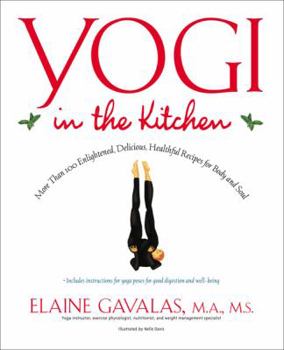Yogi in the Kitchen
Select Format
Select Condition 
Book Overview
More than just exercise, yoga can open the doors to healthier living. Yogi in the Kitchen features a full range of recipes that complement one's yoga practice--plus tips on stocking the panty with... This description may be from another edition of this product.
Format:Paperback
Language:English
ISBN:1583332022
ISBN13:9781583332023
Release Date:January 2005
Publisher:Avery Publishing Group
Length:229 Pages
Weight:0.80 lbs.
Dimensions:0.7" x 7.5" x 9.1"
Age Range:18 years and up
Grade Range:Postsecondary and higher
Customer Reviews
2 ratings
More than 100 wonderfully presented recipes
Published by Thriftbooks.com User , 19 years ago
For Yogi In The Kitchen, author Elaine Gavalas draws upon her years of experience and expertise as a yoga instructor, exercise physiologist, nutritionist, weight-management specialist, and kitchen cook to provide more than 100 wonderfully presented recipes for dishes that are as good for the soul as they are nourishing for the body. Embracing the philosophy that Yoga is about healthier living in general, not just exercise, Yogi In The Kitchen begins with advice for eating the Yoga way, including how to stock one's pantry and seek balance in one's diet, as well as tips for staying healthy when eating out. Sample recipes include Baked Tofu and Vegetables, Garden de Vida Smoothie, Fresh Fruit Sorbet, and more. An excellent resource for making light, healthy, and fitness-promoting foods for oneself and one's family.
Quick taste of Ayurvedic nutrition and Yoga. Still Hungary
Published by Thriftbooks.com User , 19 years ago
`Yogi in the Kitchen' by Elaine Gavalas, M.A., M.S. is a great little mish mash of culinary doctrine, mystic lore, yoga exercises, and recipes from around the world in a fun little book which has the power to get you interested, but drops the ball in the end. While the Greeks and Romans were inventing mathematics, medicine, philosophy of knowledge, and science in the Mediterranean wild west, the Indians and Chinese were mapping the relation between body, soul, and mind in a way which has never quite been matched by Western thinkers until the advent of modern clinical psychology, which could do nothing more than affirm that the eastern mystics knew a thing or two about cultivating a healthy body and mind. This book by a talented dabbler in both eastern lore and western nutritional science is a very nice introduction into all these matters. Ms. Gavalas manages to turn a very loose presentation into a virtue in that she does not bore us with dozens of pages on arcane Sanskrit derived words for the eastern version of a form of astrology. For those who may be buying this book for recipes, know that in these 230 pages, 60 are devoted to the light introduction to the four different doctrines the author throws together into a mix of healthy eating regimens. These doctrines are vegetarianism, the Mediterranean diet, the Asian diet, and the ayurvedic diet. These first three are pretty well known to the average Western foodie, although the `Asian Diet' has gotten much less press and scientific review as a healthy regimen than the `Mediterranean diet'. The Ayurvedic diet is a development of Hindu doctrines and Yoga. The author describes it as `Yoga's sister science, ... a five thousand year old Indian holistic healing system for the body, mind, and spirit. The goal of Ayurveda, which means "the science of life" in Sanskrit is to achieve balance, vitality, energy, and perfect health through proper nutrition, exercise and meditation'. The Ayurveda doctrine states that there are three basic body types, for which there are three recommended diets. A quick look at the description of the body types gives one a jolt of recognition when you recognize a distinction between the modern `apple' and `pear' shaped body types, plus a corresponding set of emotional and intellectual dispositions which will almost invariable describe one which fits you better than the other two. But then, most people get the same reaction when they read a description of their astrological sign. The descriptions of the three body / personality types are so general that confirming this lore using scientific techniques is almost impossible, which means the doctrines are so general as to be empty. And yet, they do seem to have some grounding in common sensical observations, and the Indians who groom this doctrine have spent the last 5000 years refining the empirical observations which have gone into the doctrine, so the odds are pretty good that they have gotten some things right. On several






